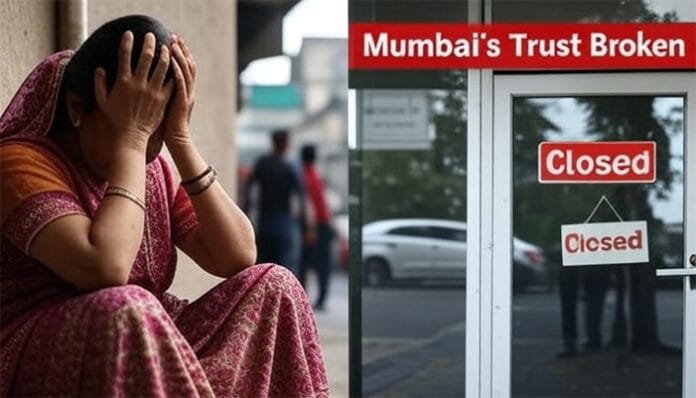The Mumbai, India’s financial capital and a symbol of modern progress, is currently grappling with a disturbing surge in sexual assault, rape, and sextortion cases. In 2025 alone, over 400 rape complaints have been officially filed within the first five months, highlighting an alarming deterioration in the safety and dignity of women across the metropolis. Two horrific incidents—one in Kurar, Malad, and the other in Kandivali-East—have further shaken public confidence and sparked widespread outrage.
Three-Year Nightmare in Malad: A Case of Coercion and Betrayal
A deeply disturbing case surfaced recently from Kurar village in Malad-East, where a woman endured three years of sexual abuse under the threat of sextortion. In 2022, the accused clandestinely recorded an obscene video of the victim as she bathed in her own home. This video became the weapon used to control, manipulate, and destroy the woman’s autonomy.
Under the threat of making the explicit footage viral, the perpetrator repeatedly raped her and eventually recorded another video of the assault, using it as further leverage. Over the years, the accused extorted the woman’s gold jewelry—approximately 8 tolas—and ₹1.5 lakh in cash, robbing her not only of her dignity but also her financial security.
What intensifies the horror of this case is that the victim’s husband remained unaware throughout the ordeal. It was only when the situation became unbearable that she revealed everything to him. The couple immediately approached the Kurar Police Station, and a case was registered under rape, extortion, and cybercrime laws.
Senior Police Inspector Sanjeev Tawde confirmed the complaint and assured that a manhunt is underway to arrest the absconding accused. The case has brought the harsh realities of digital exploitation and long-term sexual coercion to the forefront of public discourse in Mumbai.
Doctor Turns Predator: Rape Inside Clinic in Kandivali-East
In another grotesque incident from Kandivali-East, a doctor sexually assaulted a female patient inside his clinic located in Krantinagar. The woman had visited the clinic for a routine check-up. Seizing the opportunity in the absence of other patients, the doctor raped her inside his private cabin.
By the time the victim reached the Charkop Police Station to report the incident, the accused had fled. Investigations revealed that the doctor worked at a reputable hospital but had opened this clinic under his wife’s name, presumably to conceal any future wrongdoing.
According to Senior Inspector Jaywant Shinde, a rape case has been formally registered and efforts are ongoing to track down and arrest the accused. The audacity of this assault—committed in a space that symbolizes care and trust—has further fueled public fury.
A Disturbing Spike: Over 400 Rape Cases in 2025
These cases are not isolated events. Mumbai has witnessed a massive spike in sexual violence, with over 400 cases of rape and sexual abuse registered in just five months of 2025. The trend reflects not only a rise in criminal behavior but also a growing culture of impunity, enabled by digital threats, societal stigma, and loopholes in victim protection.
These disturbing statistics have prompted law enforcement agencies, women’s rights activists, and policy-makers to demand immediate systemic reforms.
The Modus Operandi: From Voyeurism to Sextortion
What makes these crimes particularly heinous is the method of execution. In the Kurar case, the perpetrator started with unauthorized surveillance, filming the woman during her most private moments. This escalated into digital blackmail, rape, and continued extortion. The criminal leveraged modern technology—smartphones, cloud storage, and social media platforms—to assert control over the victim’s body, life, and finances.
This pattern is becoming increasingly common. Sextortion, a form of blackmail where sexual images or videos are used to demand sexual favors or money, is on the rise across metropolitan cities. Experts warn that victims often remain silent for years due to fear, shame, and threats to their families.
Legal Actions and Police Response
Authorities have responded by registering FIRs under Section 376 (Rape), Section 384 (Extortion), and Section 354C (Voyeurism) of the Indian Penal Code, along with relevant provisions of the Information Technology Act. Both the Kurar and Kandivali incidents are being treated as priority cases, with senior officers overseeing investigations.
However, challenges persist. The absconding status of both accused individuals raises questions about the effectiveness of immediate police action and the ease with which criminals exploit loopholes.
Public Outcry and Demands for Swift Justice
Mumbai residents, women’s groups, and civil society organizations have expressed outrage over these cases. Demands for fast-track courts, stricter digital surveillance, and enhanced protection mechanisms for victims have grown louder. Protests in Malad, Kandivali, and Kurla have seen local communities come together to call for urgent reforms in how sexual crimes are handled, especially those involving digital exploitation.
How Women Can Protect Themselves from Sextortion and Assault
With cases of sextortion increasing, experts recommend the following safeguards for women:
Never leave your phone unattended or unlocked.
Use privacy filters and camera blockers in bathrooms and changing areas.
Regularly check for hidden cameras in unfamiliar spaces.
Report any suspicious behavior or blackmail attempts to the Cyber Crime Cell immediately.
Never hesitate to seek help or file a police complaint, no matter the level of embarrassment or fear.
Conclusion: A City in Crisis, A Call for Accountability
Mumbai, once a beacon of modernity and progress, is facing a crisis that strikes at its moral core. The Kurar and Kandivali rape cases are grim reminders that technological advancement without social responsibility is dangerous. Women are being exploited through hidden cameras, threats of public shaming, and the misuse of personal data.
With over 400 cases in 2025, it’s no longer a question of isolated incidents—this is a systemic issue requiring immediate attention. The time for half-measures is over. Mumbai’s citizens, law enforcement, and government must act together to restore the safety, dignity, and justice that every woman deserves.
















